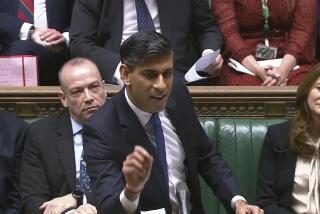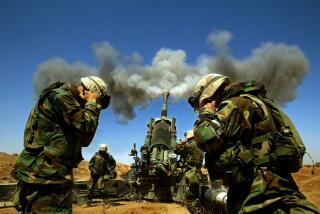Blair Wins Vote in Parliament to Join a U.S. Invasion of Iraq
- Share via
LONDON — Prime Minister Tony Blair won a comfortable mandate from the British House of Commons on Tuesday, convincing reluctant legislators to endorse a motion backing “all means necessary” to disarm Iraq’s Saddam Hussein. The victory came without the political cover of the U.N. Security Council ultimatum that Blair had so desperately pursued but never managed to get.
The prime minister deployed a powerful blend of argument and arm-twisting to win the vote by a ratio of roughly 2 to 1. About a quarter of the members of Parliament from Blair’s own Labor Party opposed the motion for war, an indication of the persistent unease in Britain over invading Iraq without U.N. sanction.
But it was a manageable rebellion for Blair, who appears to draw oxygen from risk. Warning “this is not the time to falter,” he predicted that recoiling from military force would only encourage other tyrants and weaken the international community.
“Tell our allies that at the very moment of action, at the very moment they needed our determination, that Britain faltered?” Blair asked rhetorically. “I will not be party to such a course.”
The phrase was not so much a hint at resignation as a refusal to even contemplate turning back. Despite a frenzied week in British politics, Blair’s leadership is not yet really in danger. He suffered the resignation of one senior minister in Robin Cook, the former foreign secretary whose defection gives the antiwar camp an articulate voice to challenge Blair.
However, the predicted flood of resignations never materialized. Two junior Cabinet ministers quit Tuesday, but Blair was able to persuade Clare Short, a minister who has been a darling of the Labor Party’s left wing, to remain. A week ago, Short had excoriated Blair for his “reckless” handling of the Iraqi crisis, vowing to resign if he took Britain to war without U.N. backing. On Tuesday, she sat on the Commons’ front bench near Blair, a symbol of the prime minister’s ability to contain any rebellion.
Even many of the members of Parliament who disagree vehemently with their leader over the war qualified their objections Tuesday with praise for what they described as his tireless attempts to find a consensus at the Security Council.
“Everybody feels the prime minister has done his very best,” said Clive Soley after Blair spoke to a closed-door meeting of Labor legislators before Tuesday’s debate. “There was a feeling today that Tony has tried hard, but the French just made it impossible for him.”
Blair and his ministers have relentlessly characterized the French vow to veto a second U.N. resolution as disloyal. Blair lamented Tuesday that the Security Council’s “capacity to pass firm resolutions is only matched by our feebleness in implementing them.” The French veto threat, he said, had “shut off the only route to peace.”
Privately, the Blair camp believes the portrayal of the French government as malicious mischief makers has softened the British public’s hostility to war. The most recent polls back that view, showing opposition to a war declining.
Meanwhile, Blair’s personal approval rating is rising, a swing his officials attribute to grudging respect for the prime minister’s adrenaline-fueled diplomacy. Indeed, it has become a sort of parlor game in Britain in recent weeks to count each new stress line on the prime minister’s face.
“Sure he’s weary. Who wouldn’t be?” said a friend of Blair’s, with a short laugh. “But he’s a politician -- this is what these guys are made for. And it’s been part of their strategy to show that he was killing himself to get that U.N. resolution.”
But with his draft resolution diplomatic road kill on the route to war, Blair had to hone the case for joining Washington’s invasion without U.N. backing.
In a 52-minute speech to the House of Commons, the prime minister argued that backing away from confrontation at this late hour “would put at hazard all we hold dearest, turn the U.N. back into a talking shop, stifle the first steps of progress in the Middle East and leave the Iraqi people to the mercy of events on which we would have relinquished all power to influence for the better.”
The outside world has a responsibility to fulfill the expectations of freedom it has raised among Iraqis, Blair said. And should allied troops turn back now, “the darkness would close back over them again, and [Hussein] will be free to take revenge upon those he must know wish him gone.”
“If we turn away at the point of reckoning,” he said, “what then? Who will celebrate and who will weep if we pull our troops back now?”
*
(BEGIN TEXT OF INFOBOX)
Excerpts from Blair’s speech
If this house now demands that at this moment, faced with this threat from this regime, that British troops are pulled back, that we turn away at the point of reckoning, and that is what it means -- what then? What will Saddam feel? Strengthened beyond measure. What will the other states who tyrannize their people, the terrorists who threaten our existence, what will they take from that? That the will confronting them is decaying and feeble. Who will celebrate and who will weep?
*
This house wanted this decision. Well it has it. Those are the choices. And in this dilemma, no choice is perfect, no cause ideal.
*
To retreat now, I believe, would put at hazard all that we hold dearest, turn the U.N. back into a talking shop, stifle the first steps of progress in the Middle East, leave the Iraqi people to the mercy of events on which we would have relinquished all power to influence for the better. Tell our allies that at the very moment of action, at the very moment when they need our determination, that Britain faltered? I will not be party to such a course. This is not the time to falter.
Source: The Guardian
More to Read
Sign up for Essential California
The most important California stories and recommendations in your inbox every morning.
You may occasionally receive promotional content from the Los Angeles Times.













